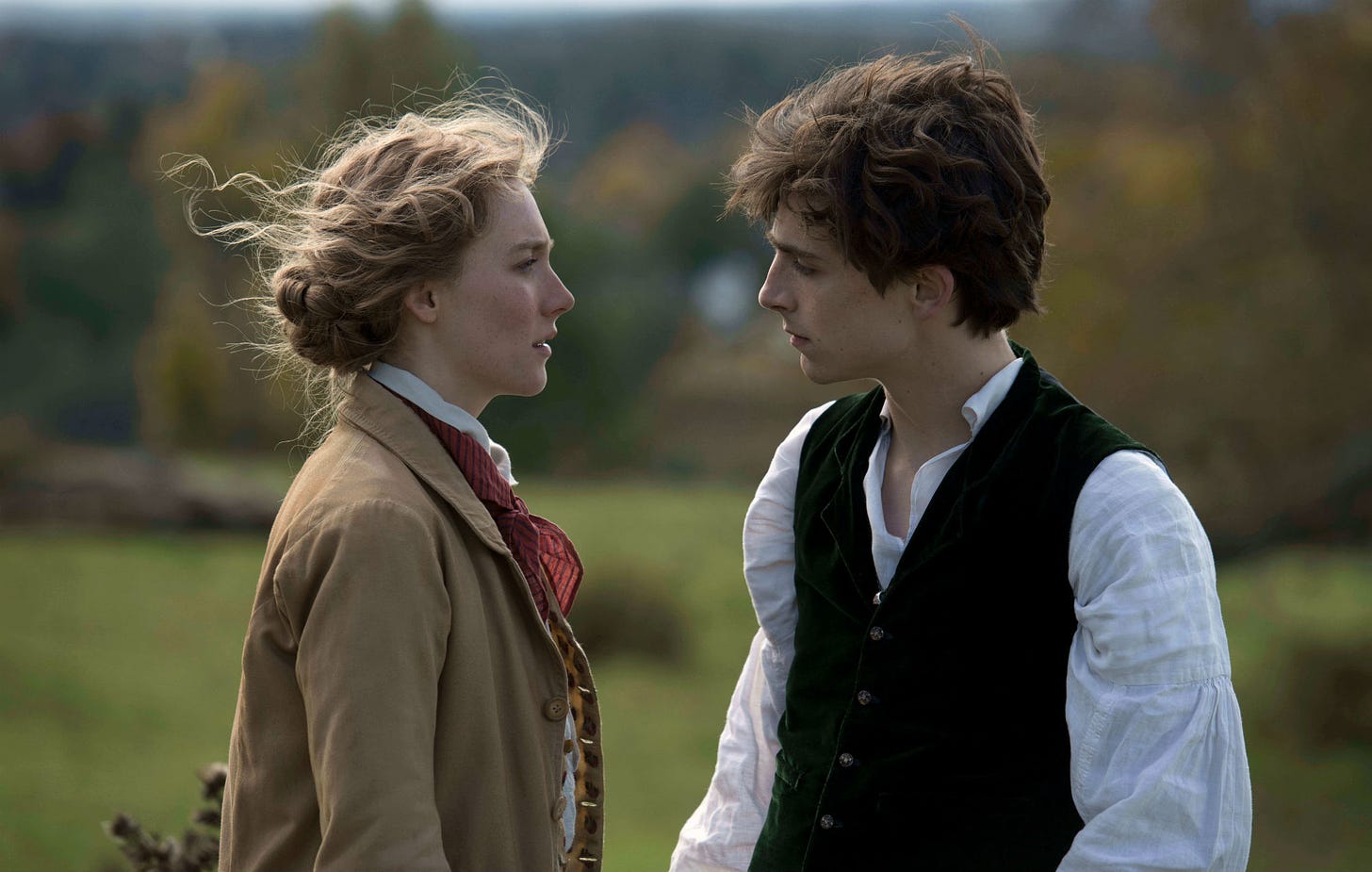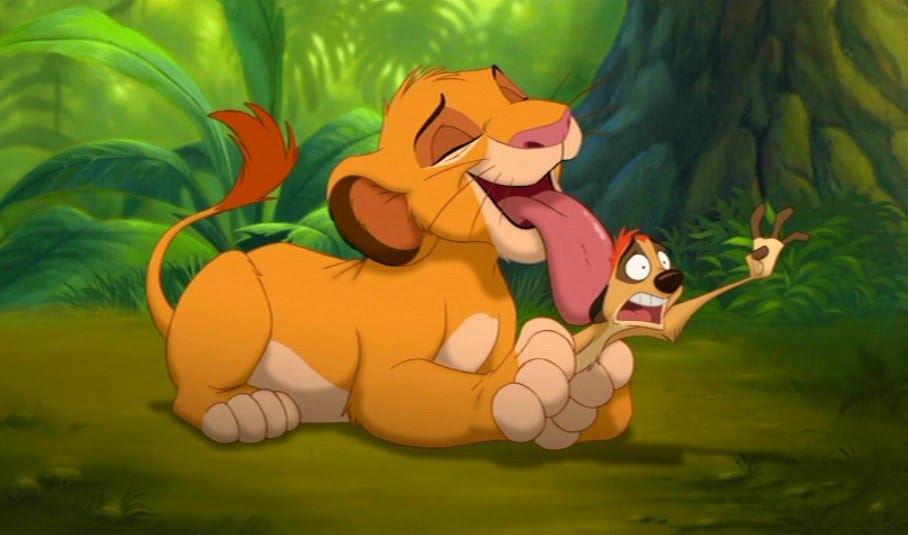The new Little Women trailer dropped yesterday, and it looks good, and I’m excited to see it. Like many other book-admiring woman, I have had the ghost of Louisa May Alcott pushed on me like a high fibre diet. And, like many woman, I don’t so much as enjoy Little Women as I enjoy taxonimising people based on where the fall in the Little Women rubric. “Which Little Women are you?” is a good enough game to play when “Which wife of Henry VIII are you?” runs dry (which it never will).
But even that’s not very satisfying, because Little Women isn’t really about women. It’s about Jo March, and how she turned down her hot neighbour so she could invent feminism.

I think this is what irritates me about Little Women the most: that it purports to be about the complex bonds between four very different sisters, but really, it’s about how one kooky fruit just refused to obey social conventions, and golly, in hindsight, don’t we all agree that it was a solid move? Meg and Beth aren’t really characters. Meg exists so Jo can be horrified by her conventional life; Beth exists so she can die, and so we can see the tender side of Jo.
Amy is the only other interesting March, because she hates Jo, and is brave enough to do so. Little Women is not a book about the unbreakable bonds of sisterhood. It is a book about an endless grudge match between a fantasist and a sociopath, and I would respect Little Women so much more if it were just honest about that.
As you can probably tell by my finely-tuned rage, this is not the first time I have engaged the internet with such discourse. It has never gone well for me. Inevitably, a bunch of women will land in my Twitter mentions to tell me that Jo March inspired them to be a writer, that Jo was a representation of an ambitious young woman in literature, blahblahblah.
First of all: I would wager that the women who were encouraged to become writers because of Jo March probably didn’t need all that much encouragement in the first place. Sorry, but it’s true. If you’re already reading Little Women as a child or as an adolescent, a boring and old book, I imagine someone has already enrolled you in a creative writing class or a gifted student programme. You were fine.
Second, these women are always like, thirty years old. Lady: there were tons of books about ambitious girls when you were a kid! Tracy Beaker! Matilda! Charlotte from Charlotte’s Web (“a great friend, and a good writer”)!
The thing that I hate the most about Jo March, or rather, the cultural legacy of Jo March, is that it encourages a kind of vile Main Characterism that is very irritating to be around. You know what I mean. There is a certain kind of adult person that, for whatever reason, has had their inner monologue indulged a little too much, and has overestimated their position within the scheme of things. These are the people who start conversations with “well, as a child…” and who, at a market in a foreign country, will announce “I simply adore just seeing the produce!” It’s the sense that everything exists so it can live in relation to them, that their story is always the centre one, that their dearest friends and family only exist so they can be “ah, my dearest friends and family: look at the qualities in myself they serve to highlight!”
We all have a little of this. Everyone’s allowed suffer bouts of it, even bad bouts. But believe me when I tell you that some people, and yes, a lot of these people are in the Online Book World, are just this. People who meet you, and they might as well say: Hello, it’s me. The main one. I’ve arrived. I’m the main one.
Jo March encourages Main Characterism. So does Carrie Bradshaw, but for some reason I’m more tolerant of her, because the narrative knows Carrie is prone to doing this – other characters bring it up constantly.
On Sunday I went over to my friend Jen’s house and we put on The Lion King 3, sometimes called The Lion King 1 1/2: Hakuna Matata, a film that Jen inexplicably owns on DVD. I have known Jen for six years, and she has brought up her love of The Lion King 1.5 at least a dozen times. Which might not seem like a lot of times, but it is for a straight-to-VHS threequel to a Disney film. I finally gave in and watched it with her.
The opposite of Jo March is not Amy March.
The opposite of Jo March is The Lion King 1 1/2: Hakuna Matata

The premise of the movie is that Timon and Pumba tell the story of The Lion King from their point of view. It begins with an origin story about Timon, whose family dig tunnels, and who is bad at digging tunnels, and eventually leaves home to make a life elsewhere. He falls in with Pumba, they find a perfect place to live, then Simba comes along and turns them both into parents before they are ready to, until Nala shows up and Simba has to return. The film must have been incredibly cheap to make, because it has whole scenes lifted from the original Lion King. It is extremely silly, and the joke rate is sky high, and by the end, I was bawling my eyes out.
What The Lion King 1 1/2: Hakuna Matata understands that Little Women doesn’t is that everyone’s life, everyone’s journey, is inherently infused with purpose, with bravery, with vigour, with action, even if they are clearly not the main character. In fact, it rejects the idea of a main character. There’s even a bit where Timon, when listening to Nala tell him about the Scar/Mufasa/Simba triangle that he asks her to start again, with just the relevant information “not that your childhood wasn’t fascinating.”
In the end, Simba ascends Pride Rock and tells Timon and Pumba that “I couldn’t have done it without you”. Which is a nice line if you have only watched The Lion King, but is an excruciatingly beautiful and painful one if you have just watched an hour and a half of a warthog and a meerkat trying to raise an emotionally damaged baby lion club with great difficulty. The lions are the Jo Marches, and Timon and Pumba aren’t even the sisters, they’re the cooks bumbling around, wondering why the fuck Jo has sold her hair. And they matter just as much. Disney has played a few nasty tricks on the human psyche, but my god, in that moment, I forgave them everything. I forgave it all.


